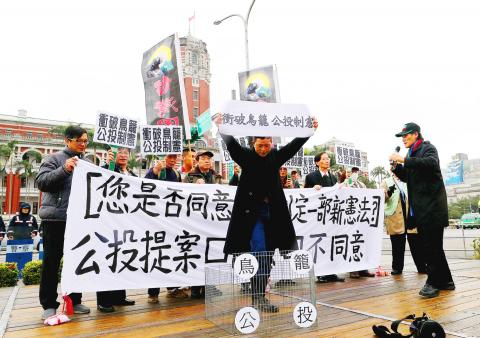The New Power Party (NPP) yesterday put forward six referendum topics regarding sovereignty and labor rights, including sensitive proposals dealing with the nation’s territory and official name, and said it would conduct an online poll to decide which two of the six topics the party should advocate to propose for a referendum.
Four of the topics fall within the category of sovereignty: whether the president should convene a “citizens’ constitutional convention” to draft a new constitution, which would need to be approved by referendum; whether Taiwan should seek to compete in the 2020 Tokyo Olympics under the name “Taiwan”; whether the government should define the country’s territory as “Taiwan, Penghu, Kinmen, Matsu and other islets”; and whether the English name “Republic of China” should be removed from Taiwanese passports.
In the labor rights category, the party proposed two questions: whether the Legislative Yuan should pass a “national holiday act” to ensure a minimum of 19 national holidays each year for public and private employees and whether it should pass a “minimum wage act” that guarantees the minimum income needed to sustain the basic living needs of employees and their families.

Photo: CNA
The NPP invited the public to vote on the six proposals on its Web site from yesterday to Thursday, saying it would initiate the referendum process for the most favored topic in each of the two categories and expects to submit the two referendum proposals to the Central Election Commission next month at the earliest.
The NPP’s proposals followed the passage of an amendment to the Referendum Act (公民投票法) that lowers the thresholds for initiating, seconding and passing referendums.
“[The proposal] to establish a ‘citizens’ constitutional convention’ is in line with the essence of Sunflower movement, which called for a convention to draft a constitution appropriate to Taiwan through a bottom-up decisionmaking process,” NPP Executive Chairman Huang Kuo-chang (黃國昌) said
Redefining the nation’s territory is crucial to help Taiwan assert its sovereignty and would have a positive effect on policymaking and budgeting, Huang said.
The NPP’s proposals have been criticized as being in conflict with the amendment, which rules out territorial changes and constitutional amendments as viable referendum topics.
Huang said that even though the party would touch on the issue of the nation’s territory and official name, none of the issues would require any changes to the Constitution.
The Democratic Progressive Party described the act as a procedural bill regulating how referendum processes should be carried out, not what topics the public can vote on, Huang said, adding that the NPP believes the public has the right to vote on the six topics.
“How could a purely procedural bill deprive citizens of the power to vote on those issues?” NPP Legislator Hsu Yung-ming (徐永明) said, calling on the commission to uphold the values of democracy when the NPP initiates the referendum processes.
While same-sex marriage opponents have reportedly planned to launch a referendum on the issue, Huang said that basic human rights cannot be put to vote and a referendum could not override the constitutional interpretation in May that found the statutory ban on same-sex marriage to be unconstitutional, Huang said.

Chinese Nationalist Party (KMT) Chairman Eric Chu (朱立倫), spokeswoman Yang Chih-yu (楊智伃) and Legislator Hsieh Lung-chieh (謝龍介) would be summoned by police for questioning for leading an illegal assembly on Thursday evening last week, Minister of the Interior Liu Shyh-fang (劉世芳) said today. The three KMT officials led an assembly outside the Taipei City Prosecutors’ Office, a restricted area where public assembly is not allowed, protesting the questioning of several KMT staff and searches of KMT headquarters and offices in a recall petition forgery case. Chu, Yang and Hsieh are all suspected of contravening the Assembly and Parade Act (集會遊行法) by holding

PRAISE: Japanese visitor Takashi Kubota said the Taiwanese temple architecture images showcased in the AI Art Gallery were the most impressive displays he saw Taiwan does not have an official pavilion at the World Expo in Osaka, Japan, because of its diplomatic predicament, but the government-backed Tech World pavilion is drawing interest with its unique recreations of works by Taiwanese artists. The pavilion features an artificial intelligence (AI)-based art gallery showcasing works of famous Taiwanese artists from the Japanese colonial period using innovative technologies. Among its main simulated displays are Eastern gouache paintings by Chen Chin (陳進), Lin Yu-shan (林玉山) and Kuo Hsueh-hu (郭雪湖), who were the three young Taiwanese painters selected for the East Asian Painting exhibition in 1927. Gouache is a water-based

Taiwan would welcome the return of Honduras as a diplomatic ally if its next president decides to make such a move, Minister of Foreign Affairs Lin Chia-lung (林佳龍) said yesterday. “Of course, we would welcome Honduras if they want to restore diplomatic ties with Taiwan after their elections,” Lin said at a meeting of the legislature’s Foreign Affairs and National Defense Committee, when asked to comment on statements made by two of the three Honduran presidential candidates during the presidential campaign in the Central American country. Taiwan is paying close attention to the region as a whole in the wake of a

OFF-TARGET: More than 30,000 participants were expected to take part in the Games next month, but only 6,550 foreign and 19,400 Taiwanese athletes have registered Taipei city councilors yesterday blasted the organizers of next month’s World Masters Games over sudden timetable and venue changes, which they said have caused thousands of participants to back out of the international sporting event, among other organizational issues. They also cited visa delays and political interference by China as reasons many foreign athletes are requesting refunds for the event, to be held from May 17 to 30. Jointly organized by the Taipei and New Taipei City governments, the games have been rocked by numerous controversies since preparations began in 2020. Taipei City Councilor Lin Yen-feng (林延鳳) said yesterday that new measures by